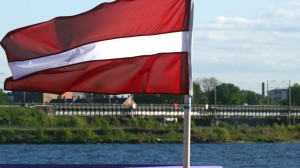Ask Latvian schoolchildren to write an essay about the Latvian flag and they will give you an earful about patriotism, the economy, ice hockey, politics, the soul, and the ultimate meaning of life.
When the Latvian foreign ministry invited Latvian schoolchildren to write essays entitled “My Flag Story” to mark the 730th anniversary of the Latvian flag, 217 eager essayists responded. Some wrote about the flag’s history as drawn from ancient chronicles or simply imagined its birth in wildly creative fantasies. Some told stories about how their parents and grandparents bravely hid the flag away in attics and basements during the years it was banned under Soviet rule. Some even personified the flag and described what it was like to witness several hundred years of Latvian history from an observant flag’s point of view.
One young philosophically inclined girl claimed the flag, like human beings, was both physical and spiritual, and had a soul and a collective memory. Another, more marketing-oriented student saw it as a cherished “company logo” that we use to present Latvia to the world.
Since the schoolchildren were from the 5th to 12th grades, none had even been born yet when Latvia restored its independence in 1991, and thus for all of them, the red-white-red Latvian flag is the only one they have ever known. Yet all knew that the flag was first observed in Cēsis in the 13th century and is one of the oldest in the world. They also knew that the Latvia lost its flag when it lost its independence in 1940, but emerged in public again in 1988 with the beginning of the Atmoda (Awakening) period.
One imaginative 5th grader claimed the Latvian flag was created by the “Flag King” who lived in a castle inside an oak tree in his back yard. But many of the schoolchildren used their flag stories to reflect on some very real concerns in Latvia today. They write about Latvia’s economic woes, political divisiveness, relatives who had emigrated abroad in search of work and oligarchs who put profits before patriotism.
Many of the stories express both sadness and anger. Sadness over the tragic fate of those who fought and died for the flag, be they riflemen in 1919 or soldiers who fought the Nazis and Soviets during World War II. Or anger at those today who have lost faith in this country because they dislike the politicians who run it. As one young 7th grader wrote, “It is time we pulled ourselves together and understood that the flag symbolizes freedom, freedom to do great and noble things.”
One young girl in Liepāja sees the flag as symbol of kindness. She tells how one Latvian independence day on Nov. 18, she and some friends were on their way to a concert and encountered a homeless man, freezing in a doorway. They invited him to join them and gave him a flag to carry. The man was moved to tears. She writes, “I am convinced that the Latvian nation is united. We are ready to help others in times of need, we sympathize with those less fortunate, and try to help. United, we have fought and defended our country, our freedom, our flag.”
After reading 217 essays, it is remarkable to note just how united these schoolchildren are in their respect for the flag and love of their country. The passion that pours out of these essays cannot be simply attributed to a schoolteacher’s classroom assignment or a desire to express their literary talents. These kids really care and it shows.
I don’t know whether many adults will read these essays and find inspiration in them. Perhaps some will simply smile patronizingly and attribute this patriotism to youthful naiveté.
But these are the kids that will inherit this country from their parents and one day become adults themselves. They will become politicians and teachers, and entrepreneurs, and policemen. They will be running this country and raising their own children. Based on what I read, I would be proud to pass our flag into their hands.
One young man, who poetically spoke on behalf of the flag, ended his essay this way, “I am stubborn and will never allow myself to be discarded in a cold and wet corner. I need the sun, the wind of a free sea and my own land, over which I can radiate the light of freedom and loyalty.”
Ojārs Kalniņš is the director of the Latvian Institute. The Latvian Institute (Latvijas institūts) was established by the Latvian government to provide a wide range of information about Latvia, its society, culture and history. For more information visit www.li.lv.
Disclaimer:
Views expressed in the opinion section are never those of the Baltic Reports company or the website’s editorial team as a whole, but merely those of the individual writer.













